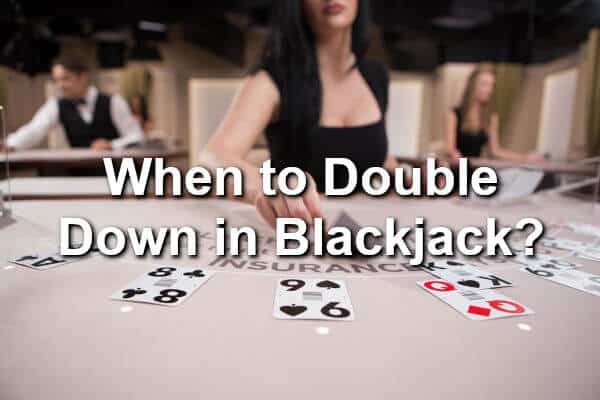Doubling down in Live Dealer Blackjack
As I said above, there are specific table rules that this strategy applies to. It will apply to any game with those rules, whether live dealer blackjack, RNG blackjack or real blackjack.
In this article, I’ll use live dealer blackjack as the example and Evolution’s Infinite Blackjack with an RTP of 99.47%, which has a favourable set of rules, including the two main ones I mentioned – dealer must stand on Soft 17 and double down on any card.
When to Double Down
Let’s see when you’re supposed to double down, using hard totals (totals without an Ace) and soft totals (totals with an Ace).
- A Hard 11 – Always double down. Even when the dealer has an Ace.
- A Hard 10 – Double down if the dealer doesn’t have ten or Ace. Or even then.
- Hard 9 – Double down if the dealer has 2 to 6.
- Soft 16, 17, 18 – Double down if the dealer has 3 to 6.
Hard 10 or 11
A Hard ten or Hard 11 puts you in a very powerful position, as you can get 21 with one additional card.
This is why some players say you have to always double down on Hard ten and Hard 11 regardless of what the dealer has. The more cautious players say you should only double down on Hard ten if the dealer doesn’t have ten or Ace.
Others say go aggressive and double down on 10 and 11, always.
Also, note you’re never supposed to split a pair of 5’s. The correct decision is to double down, or if you’re more cautious and the dealer has an Ace, Hit.
Hard nine against Low Cards
A Hard 9 is a good hand. You can easily get 19 or 20 with one more card.
With a Hard 9, the dealer’s total is a vital thing to consider. You want the dealer’s card to be between 2 and 6. If they’re Ace or seven or above, Hit.
If you have an Ace-8, which is a Soft 9, it’s always best to Stand.
Soft 16 to 18 Against Low Cards
If you have an Ace plus a 5, 6 or 7, giving you a Soft total of 16, 17 or 18, respectively, and the dealer has 3 through 6, this is an ideal situation for doubling your bet.
Note that this is applicable when the dealer must Stand on Soft 17. If he must Hit on Soft 17, you’ll double down when the dealer has cards 2 through 6.
If you have an Ace and a lower card (2 to 4), for a Soft total of 13 to 15, it’s best just to Hit, as you are less likely to end with a high hand after being dealt just one more card.
When not to Double Down
We will never be doubling down on any total between 2 and 7, but let’s cover some other hands players are usually confused about when it comes to doubling down.
- Hard 8 – Always Hit.
- Soft 19 (A-8) – Always Stand. There is no point in taking an additional risk as the hand is already favourable and above the usual winning hand average of 18.5.
- Soft 13 to 15 (A-2, A-3, A-4) – Just Hit, as you’re less likely to end up with a high hand.
- Any Hard total over 11 – Don’t double down, as the chance of going bust with another card is too high.
Double Down After Split (DDAS)
Double Down After Split is one of the best options for you as a player.
When you are dealt a pair and split them, with this rule, you can make a double-down bet on either or both of those new hands if they meet the criteria for doubling down, as described above.
This is favourable as you want to double down on hands that meet the criteria.
It sucks if you’re not allowed to double down a hand that deserves it simply because it came from a split.
In a game where you’re playing the perfect blackjack strategy to break even, DDAS and its 0.14% advantage might just be what you need to start making money.
DDAS or no DDAS? You’ll be splitting differently.
Being allowed to double down after the split influences your overall strategy a bit.
You’ll be splitting more hands when you’re allowed to double down after splitting, which also means you’ll be doubling down more often.
Four live blackjack games offer DDAS. They are BetConstruct Live Blackjack, Ezugi Live Seven Seat Blackjack, Playtech Live Quantum Blackjack Plus and Portomaso Oracle Live Blackjack.
Most other games you’ll encounter, land-based or online, RNG or live, don’t have DDAS. This shows what a powerful and advantageous rule it is.
When DDAS is allowed, you’ll be a bit more liberal with your splitting.
You will split 22 and 33 when the house has upcards 2 through 7, as opposed to splitting when the upcards are 4 through 7 when DDAS isn’t available.
Also, with DDAS, you’re going to split 44 when the house has upcards 5 or 6; without DDAS, you wouldn’t split them. You’ll split 66 when the house has upcards 2 through 6; without DDAS, you’d split them when the upcards are 3 through 6.
After splitting, evaluate each hand separately and apply the rules for doubling down that I taught you on this page.











